2017 Annual Report Pro Bono and Tech
Pro Bono and Tech
Pro Bono
Increasing Pro Bono Among the Private Bar
Although pro bono volunteers cannot replace the work of legal aid lawyers, many of whom are subject-matter experts on the legal issues most commonly faced by low-income people, the private bar continues to be an essential partner in addressing the civil legal needs of the low-income community. Private practitioners, in-house corporate counsel, retired lawyers, law students, and paralegals are eager to assist by donating their time and talents.
LSC’s Pro Bono Innovation Fund (PBIF) supports projects that more effectively engage pro bono volunteers in serving the unmet legal needs of eligible clients. The creation of the fund was recommended by LSC’s Pro Bono Task Force in 2012. Congress allocated $2.5 million for it in LSC’s FY 2014 appropriation and increased that allocation to $4 million in subsequent years.
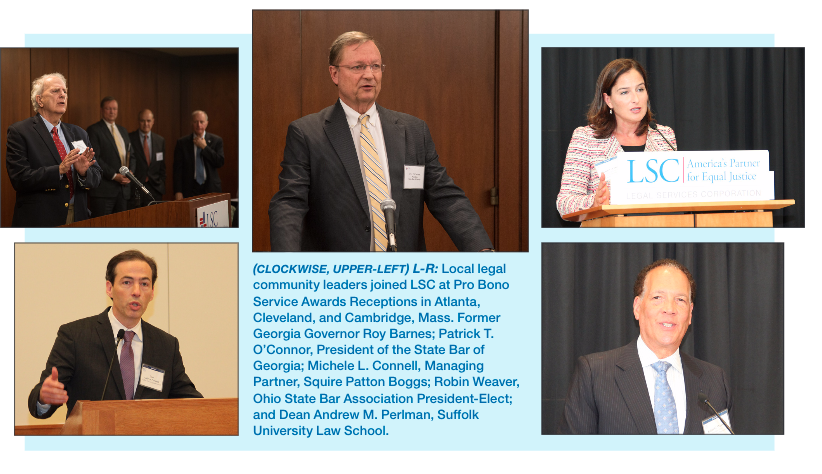 Since 2014, PBIF has invested nearly $14 million in 48 different projects in 28 states. These projects have involved collaborations with more than 30 partners, including bar-sponsored volunteer lawyers programs, health care providers, technology providers, and law schools.
Since 2014, PBIF has invested nearly $14 million in 48 different projects in 28 states. These projects have involved collaborations with more than 30 partners, including bar-sponsored volunteer lawyers programs, health care providers, technology providers, and law schools.
In September, LSC awarded grants to 15 legal aid organizations in 11 states to support innovations in pro bono legal services for low-income clients. Many of these projects use technology to connect low-income populations to resources and services, while others aim to increase efficiency and effectiveness through partnerships with law schools, corporate legal departments, and community organizations. Some projects address issues affecting specific populations such as elderly and disabled clients. PBIF grants are competitive, with significant interest from LSC grantees. The following are examples of projects funded in 2017:
Bay Area Legal Services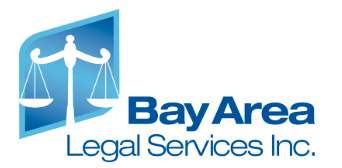
Bay Area Legal Services, headquartered in Tampa, Florida, collaborated with the Real Property Probate and Trust Law (RPPTL) Section of the Florida Bar to train pro bono volunteers to assist low-income communities in clearing titles to their homes so they are eligible for FEMA and other forms of disaster-related relief. Under this grant, the “No Place Like Home” project will be piloted with Bay Area Legal Services and four other legal aid organizations: Legal Aid of Manasota, Legal Aid Society of Palm Beach County, Legal Aid Service of Broward County, and Legal Services of North Florida.
Legal Aid of Western Missouri
Legal Aid of Western Missouri created an Adopt-a-Neighborhood Project (AAN) that uses volunteer attorneys from Kansas City’s biggest law firms to provide free legal services in targeted urban neighborhoods to support residents and neighborhood organizations. LSC’s PBIF grant will expand AAN to two additional neighborhoods with new law firm partners. After AAN was started in 2015, seven private law firms—with more than 50 pro bono attorneys—worked on more than 115 LSC-eligible cases. These cases involved more than 3,000 hours of pro bono legal assistance. In addition to the planned expansion, Legal Aid of Western Missouri plans to improve its data collection and continuing legal education offerings for pro bono volunteers and evaluate the impact of the project on the new neighborhoods. In tandem with this grant, the organization received a $70,000 grant from the Health Care Foundation of Greater Kansas City.
Legal Services NYC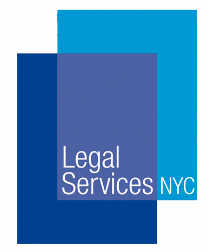
Legal Services NYC (LSNYC), in collaboration with a global law firm and corporate partners, formed the “Military Mondays” project that will provide legal assistance to hundreds of low-income veterans. As part of the project, LSNYC and pro bono attorneys will fight for disability benefits, safe and affordable housing, and fair child support for veterans through a combination of monthly legal clinics and ongoing representation. “Military Mondays” will serve as a model for engaging significant numbers of new pro bono volunteers from corporations and law firms on behalf of veterans and other low-income people around the country. To facilitate replication, LSNYC will create a “start-up kit” for other legal aid organizations to create their own “Military Mondays” initiatives.
Legal Services of Northern Virginia
Legal Services of Northern Virginia formed the Veterans Law Pro Bono Project to provide legal assistance to low-income veterans in need of discharge upgrades and disability compensation. The project will include the assistance of corporate pro bono attorneys and students at the Antonin Scalia Law School Mason Veterans and Servicemembers Legal Clinic to provide holistic legal assistance to veterans.
Technology
Leveraging Technology to Expand Access to Justice
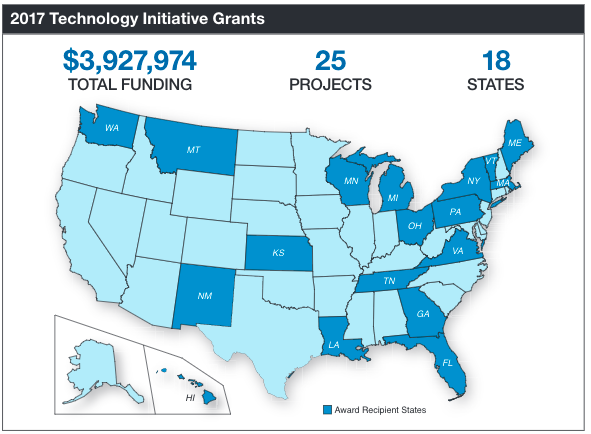 The TIG program has played a major role in this effort since 2000. TIG has funded more than 700 projects totaling more than $63 million. The TIG program supports projects that develop and replicate technologies to improve efficiency and provide greater access to high-quality legal assistance for low-income Americans. Each year, the program distributes up to $4 million to LSC-funded legal aid organizations. LSC grantees use TIG funding to explore new ways of serving eligible clients, build the programs’ capacities, and support the efforts of pro bono attorneys. Congress appropriated $4 million for TIG in FY 2017, and LSC awarded 25 technology grants to 22 legal services organizations in 18 states. These grants support a variety of initiatives, including projects to create interactive legal forms for self-represented litigants, enhance an on-line statewide “access portal” with a chatbot feature, and produce online resources for veterans and military families confronting legal problems. Examples of projects funded include:
The TIG program has played a major role in this effort since 2000. TIG has funded more than 700 projects totaling more than $63 million. The TIG program supports projects that develop and replicate technologies to improve efficiency and provide greater access to high-quality legal assistance for low-income Americans. Each year, the program distributes up to $4 million to LSC-funded legal aid organizations. LSC grantees use TIG funding to explore new ways of serving eligible clients, build the programs’ capacities, and support the efforts of pro bono attorneys. Congress appropriated $4 million for TIG in FY 2017, and LSC awarded 25 technology grants to 22 legal services organizations in 18 states. These grants support a variety of initiatives, including projects to create interactive legal forms for self-represented litigants, enhance an on-line statewide “access portal” with a chatbot feature, and produce online resources for veterans and military families confronting legal problems. Examples of projects funded include:
Connecting Health and Legal Data to Improve Outcomes in Medical-Legal Partnerships
Montana Legal Services Association will support its medical-legal partnership with community healthcare providers by integrating data collected in electronic health re-cords with legal case data to better track health outcomes following legal interventions. With a focus on conducting more comprehensive legal screenings for patients seeking medical assistance, the project will foster an integrated approach to addressing legal problems faced by low-income individuals with health problems. Iowa Legal Aid, a partner on this grant, will deploy a similar system to improve medical-legal collaborations across its service area.
Piloting the Use of Artificial Intelligence in Legal Services
West Tennessee Legal Services will enhance the state’s popular legal portal, Help4TN.org, by developing a chatbot that uses artificial intelligence to guide users through the process of finding legal resources. The chatbot will also deliver simple legal forms based on user-provided information. Community Legal Services of Mid-Florida will use its grant to minimize staff time spent on collecting and verifying data from clients, freeing up attorneys to focus on client needs. The program will integrate artificial intelligence into its client intake process. The client’s inputs will be analyzed by computers to spot issues that will be reviewed by an attorney. The system will understand language, not just commands, and get smarter as it learns from conversations with clients as well as from attorney feedback on issue accuracy.
Technology Conference
A record-breaking 300+ people attended LSC’s annual Technology Initiative Grants (TIG) Conference in San Antonio, Texas. The TIG Conference is the nation’s largest gathering of experts in using technology to address the civil le-gal needs of low-in-come Americans. Attendees gathered to share ideas and innovations for how technology can improve the delivery of legal services and expand access to justice. Participants included software developers, technology consultants, legal aid staff members, leading academics, and lawyers from a variety of practice settings.
Access to Justice Portal Project with Microsoft and Pro Bono Net
In April, LSC, Microsoft Corporation, and Pro Bono Net announced Alaska and Hawaii as state partners in a pilot program to develop online, statewide legal portals to direct individuals with civil legal needs to the most appropriate forms of assistance. LSC President Jim Sandman, Microsoft President and Chief Legal Officer Brad Smith, and Pro Bono Net Executive Director Mark O’Brien made the formal announcement at LSC’s Forum on Increasing Access to Justice on April 25 at Georgetown University Law Center.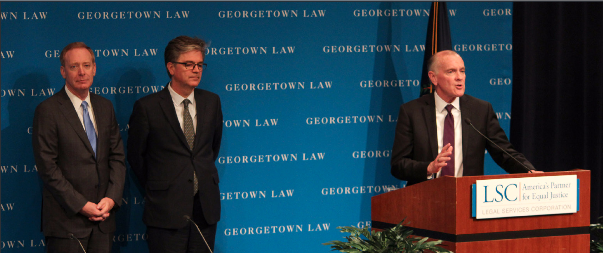
These portals will use cutting-edge, user-centered technology to help ensure that people with civil legal needs can navigate their options and more easily access solutions and services available from legal aid, the courts, the private bar, and community partners.
Alaska’s proposal was submitted by the Alaska Access to Justice Commission and Hawaii’s proposal was sub-mitted by Legal Aid Society of Hawaii with support from the Hawaii state judiciary and other justice community partners.
Alaska and Hawaii were selected because of their demonstrated track records in establishing new and collaborative resources for meeting civil legal needs; their embrace of technology’s potential to expand access to legal assistance; and their vision of partnering with allied non-legal networks such as social services, public libraries, and health care institutions to help people identify and resolve their legal issues and related social needs.
Microsoft is contributing technical and staff resources and additional funding to this project. Pro Bono Net, a national nonprofit dedicated to increasing access to justice through innovative technology solutions and expertise in building and mobilizing justice networks, will help convene local partners and provide service design expertise to execute the pilot.
